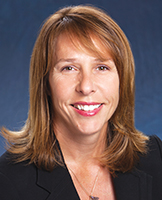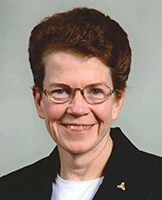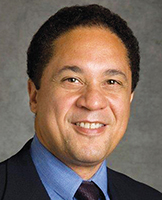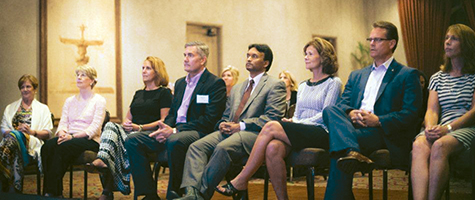By BETSY TAYLOR
Students study innovation in Silicon Valley
Michelle Robertson, recently promoted to become the president and chief executive of Ascension's Seton Family of Hospitals, said of her two-and-a-half years as a participant in Ascension's Leadership Academy: "This was, for me, the experience of a lifetime."

Robertson
Robertson was president of Seton's north group of three hospitals in central Texas and had more than two decades with Seton when she began the leadership academy in 2012 as part of the inaugural cohort of participants. The experience took her to a new level in terms of her personal and professional growth, she said. She deepened her understanding of being a servant leader in Catholic health care, was inspired by time with some of the best minds in her own company and learned about innovation, including with a visit to Silicon Valley to meet with business leaders in the technology industry.

Sr. McGuire
Ascension's leadership program develops the skills needed in a fast-paced health care environment and grounds participants in the values of the Catholic health care system, she said.
Sr. Maureen McGuire, DC, executive vice president for mission integration at Ascension, is assistant dean of the Leadership Academy. The Leadership Academy dean, Anthony Tersigni, Ascension's president and chief executive, was the driving force behind the academy's creation, Sr. McGuire said. He attends the sessions, and academy participants say they enjoy learning from him.
"It is designed for formative development, to look at the whole person, their formation and development to lead a ministry of Catholic health care and to do it in a way that is creative, and that they are capable of shaping the future," Sr. McGuire said. The system's intent is to create "a community of virtuous servant leaders" through active learning, she said. Participants take part in spiritual reflections; they talk with business leaders across industries and work together on projects they think will benefit Ascension.
Talent search
Herbert J. Vallier, Ascension's executive vice president and chief human resources officer, said the company routinely conducts talent reviews, which indicate potential candidates with the competencies and experience to be considered for the Leadership Academy. System executives also nominate emerging leaders at Ascension for the program to help them further develop skills to move to the system's most senior levels.

Vallier
Academy nominees apply and then undergo an interview and assessment screening for the academy. Selection is competitive. Once accepted, and as they begin the academy, participants are asked to spend time with a specific population of poor and vulnerable people with whom they hadn't previously had a great deal of personal contact. Robertson, for instance, spent time at a federally qualified health center learning about case management for clients, she said.
Each group in the academy, made up of about 10 to 20 Ascension employees, meets three times a year for a week at a time in face-to-face sessions called "residentials." Each group of leaders, called a "community" in the Leadership Academy, meets together over two and a half years. They often meet at a Phoenix hotel, in part, Sr. McGuire said, because there's less likelihood of weather-related travel delays in Arizona during the winter months.
As part of the academy's active learning, participants break into smaller groups to identify an opportunity that would benefit Ascension, and they design and pilot a program to operationalize their ideas. Robertson's subgroup worked on expanding telehealth services in patient care. Participants in the Leadership Academy are asked to spend between 10 and 20 hours a month on the formative leadership work, including to develop their pilot projects.
Fail fast, learn fast
Robertson's cohort was the first to graduate from the academy. The second group class is in process.
Both groups spent separate weeks in the technological innovation capital of the U.S. — Northern California's Silicon Valley. They met with senior leaders at technology companies, including San Jose, Calif.-based Cisco Systems, which designs, manufactures and sells networking equipment, and San Francisco-based SalesForce.com, a global cloud computing company.
A few concepts that resonated with program participants were tied to the idea of "fail fast" to learn fast, and to "pivot," or turn and start in a new direction. Sr. McGuire explained that the culture at innovative technology companies encourages employees to take risks and not to be discouraged when an idea doesn't work, but to learn from misfires and make improvements or move on to another idea. Ascension Leadership Academy participants were struck by the dynamics of collaborative innovation by groups of employees in Silicon Valley working together to speed the conception and execution of innovative ideas and products.
Vallier said in a time of rapid change in health care, "We have got to become more agile, engage our associates in a way that we haven't, perhaps, done in the past." As an example, he said one group of Leadership Academy participants saw firsthand how technology company Sales
Force.com employed electronic polling to get frequent feedback from targeted groups of employees on workplace-related matters. The Ascension group promoted the use of the technology at Ascension, and the health care system is preparing to do electronic polling of groups of employees. It will select groups to poll based on the topics it's probing. Collecting data more frequently from employees most affected by an issue should allow the company to be more agile in its response, Vallier said.
Courageous creativity
Ascension's Leadership Academy also continues the work of grounding the Catholic health care organization's leaders in the spiritual tradition and mission-driven work of the system. Sr. McGuire said spiritual and theological formation enables each Ascension Leadership Academy participant to be "a leader, be an innovator, be the courageous creator they need to be."
Sr. McGuire said academy participants learn and seek personal practice in the theological virtues of faith, hope and love and the cardinal virtues of prudence, justice, fortitude and temperance as well as humility and courage.

Leadership Academy participants hear speeches from Ascension executives at their community graduation and celebration at the Royal Palms Resort and Spa in Phoenix on Oct. 9. From left are, Carol Schmidt of Ascension Health in St. Louis; Amy Freeman of Providence Hospital in Washington, D.C.; Darcy Burthay of Home Care Services – Ascension Health; Bernie Sherry of Saint Thomas Health in Nashville, Tenn.; Dr. Samson Jesudass of Ascension Physician Services; Jean Meyer of St. John Providence Health System in Detroit; Tom VanOsdol of St. Vincent Health in Indianapolis; and Michelle Robertson of Seton Family of Hospitals in Austin, Texas. They were among the first to graduate from Ascension’s Leadership Academy.
She said Ascension Leadership Academy participants explore these virtues in "behavioral detail." That means small groups of program participants join together for facilitated discussions during their residential sessions. They define each virtue, reflect upon each and share personal experiences related to putting each virtue into action.
She said part of the Leadership Academy's work is to foster a culture in which participants are comfortable talking about what they are working to learn more about or struggling to figure out. "A community of leaders needs to able to be very transparent with one another. You do not have to know how to do everything. You have to know how to talk with one another about the things that perhaps for you, are a challenge," she said.
Robertson said leaders of retail business she met through the Leadership Academy got her thinking about the locations and settings where patients most want to receive their health care. Time spent with Tersigni gave her a much broader sense of the health care industry as well as Ascension's strategy and advocacy work. "Ascension is investing in us so that we can better serve our communities and mission. I feel blessed to have been part of this program," she said.
Copyright © 2015 by the Catholic Health Association of the United States
For reprint permission, contact Betty Crosby or call (314) 253-3477.